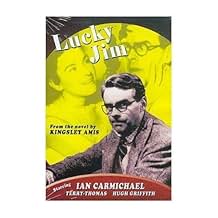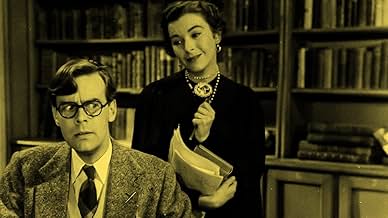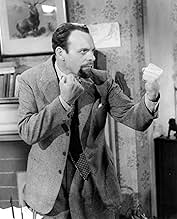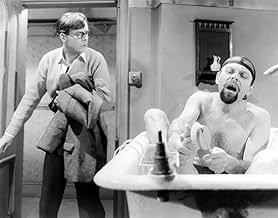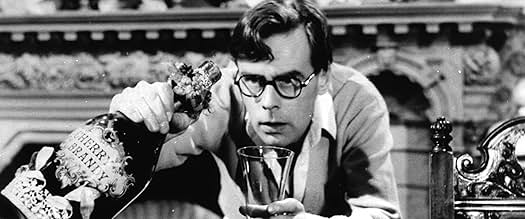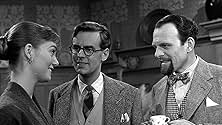NOTE IMDb
5,9/10
800
MA NOTE
Ajouter une intrigue dans votre langueJim Dixon struggles with university work, Professor Welch's boring behavior, and his neurotic friend Margaret Peel. His misery is further complicated by his son Bertrand and companion Christ... Tout lireJim Dixon struggles with university work, Professor Welch's boring behavior, and his neurotic friend Margaret Peel. His misery is further complicated by his son Bertrand and companion Christine Callaghan.Jim Dixon struggles with university work, Professor Welch's boring behavior, and his neurotic friend Margaret Peel. His misery is further complicated by his son Bertrand and companion Christine Callaghan.
- Réalisation
- Scénario
- Casting principal
John Welsh
- The Principal
- (as John Welch)
Henry B. Longhurst
- Professor Hutchinson
- (as Henry Longhurst)
Avis à la une
Lucky Jim is directed by John Boulting and adapted from the Kingsley Amis novel of the same name. It stars Ian Carmichael, Terry-Thomas, Hugh Griffith, Sharon Acker and Jean Anderson.
A Redbrick university In Britain's New Elizabethan Age: Here Are Moulded The Intellectual Drakes And Raleighs Of Tomorrow-Fearless, Independent- -
And State Supported!
Enter Carmichael's accident prone Jim Dixon, who in order to keep his job at the University has to do the bidding for Griffith's dull Professor Welch. Worse still, maybe, is having to spend time with his boorish family, especially the Son, pompous show off Bertrand (Thomas). Salvation may come in the form of Bertrand's companion, though, Christine Callaghan (Acker)?
I haven't read the Amis novel this is based on, so can't have frame of reference there. By all accounts it's very different, and staunch Amis supporters are very dismissive of the Boulting movie. The film itself is hardly prime Boullting Brothers, who would produce British classics such as Brighton Rock and I'm All Right Jack, but it has a number of funny scenes whilst also being nicely flecked with satirical flavouring. Carmichael attacks the lead role with gusto and comic affability, while "scary eyebrows" Griffith and Terry-Thomas provide good comedy footings for Carmichael to work from. The ladies are pretty and effective enough, without really doing anything any other British actress of the time couldn't have done, but all told it's a well acted and genial time filler for the undemanding. 6.5/10
A Redbrick university In Britain's New Elizabethan Age: Here Are Moulded The Intellectual Drakes And Raleighs Of Tomorrow-Fearless, Independent- -
And State Supported!
Enter Carmichael's accident prone Jim Dixon, who in order to keep his job at the University has to do the bidding for Griffith's dull Professor Welch. Worse still, maybe, is having to spend time with his boorish family, especially the Son, pompous show off Bertrand (Thomas). Salvation may come in the form of Bertrand's companion, though, Christine Callaghan (Acker)?
I haven't read the Amis novel this is based on, so can't have frame of reference there. By all accounts it's very different, and staunch Amis supporters are very dismissive of the Boulting movie. The film itself is hardly prime Boullting Brothers, who would produce British classics such as Brighton Rock and I'm All Right Jack, but it has a number of funny scenes whilst also being nicely flecked with satirical flavouring. Carmichael attacks the lead role with gusto and comic affability, while "scary eyebrows" Griffith and Terry-Thomas provide good comedy footings for Carmichael to work from. The ladies are pretty and effective enough, without really doing anything any other British actress of the time couldn't have done, but all told it's a well acted and genial time filler for the undemanding. 6.5/10
Kingsley Amis might not had liked the adaptation of his novel set in a redbrick university in 1950s Britain when university education started to expand and took on some working class students. The Boulting brothers film comes across a little too much of an Ealing comedy for my liking with slapstick and loses the novel's edge.
Ian Carmichael is the northern grammar school boy made good but looking for a permanent teaching job at the university. To do this he has to toady to Professor Welch and his family and every task he is entrusted to do ends in disaster sometimes due to Jim's shortcomings.
As a lecturer Jim is passionate with a leftist slant on history in contrast with Professor Welch dull and old fashioned musings which we see when Jim has to deliver Welch's lecture.
In between we have Jim getting into escapades with Terry Thomas and his Canadian girlfriend and a slapstick scene involving a parade with flowers on the quadrant of the university.
However whilst Carmichael is spirited as Jim he looks too old, even worse Terry Thomas looks too old as the son of the Professor Welch.
The film is episodic and although starts promisingly enough it tries too hard to be an Ealing style comedy rather than a satirical adaptation. The redbrick university never convinces maybe I have seen too many of these places that were built in the 1960s.
Ian Carmichael is the northern grammar school boy made good but looking for a permanent teaching job at the university. To do this he has to toady to Professor Welch and his family and every task he is entrusted to do ends in disaster sometimes due to Jim's shortcomings.
As a lecturer Jim is passionate with a leftist slant on history in contrast with Professor Welch dull and old fashioned musings which we see when Jim has to deliver Welch's lecture.
In between we have Jim getting into escapades with Terry Thomas and his Canadian girlfriend and a slapstick scene involving a parade with flowers on the quadrant of the university.
However whilst Carmichael is spirited as Jim he looks too old, even worse Terry Thomas looks too old as the son of the Professor Welch.
The film is episodic and although starts promisingly enough it tries too hard to be an Ealing style comedy rather than a satirical adaptation. The redbrick university never convinces maybe I have seen too many of these places that were built in the 1960s.
Jim Dixon works in that most protected of places a redbrick university! However his natural laziness and clumsiness sees him forced to keep in the favour of the dull and absentminded Professor Welch in order to protect his job. With his natural affinity for bad luck, Jim struggles to find a quiet life and a unwanted romance with Margaret (the professor's friend) just make things more difficult. Things get worse when he is put in charge of organising things for the new chancellor but Welch's son arrives in the company of a beautiful young woman, Christine, who Jim finds very attractive but totally unattainable.
With people like the Boutling brothers, Carmichael and Thomas involved I was definitely going to watch this film when they showed it last week as part of the normal cycle of black & white films on daytime TV afternoons, however I must admit not to be entirely won over by this. I have not read the book on which this is based, but I am told that it is a great deal sharper than this film, not a surprise since the film surprised me by having absolutely no satirical edge to it whatsoever and instead seemed to be aiming to be a vague farce. The plot has no sharp edges to it and it only has a very basic sense of humour that involves more pratfalls than witty dialogue and, as a result, I found little here that I actually cared enough about to get into the film. The laughs weren't forthcoming, the plot was rather shallow and uninteresting and the characters were thin.
With all these problems it is no real surprise that even the talent in this cast struggle to make anything of it. Carmichael plays it all too foppish and clumsy and he never really gets a character out of the film. Even Terry Thomas seems unsure of what he is supposed to be doing with this stuff and he doesn't make any memorable impact. Acker is very pretty and Griffith is suitable cast but generally the cast are let down by the material.
Overall this is an average film that doesn't compare to the many better films that the main cast members, producer and director have all done. Usually I would say that any film with these people involved would be worth seeing but unfortunately I can say it about this outing.
With people like the Boutling brothers, Carmichael and Thomas involved I was definitely going to watch this film when they showed it last week as part of the normal cycle of black & white films on daytime TV afternoons, however I must admit not to be entirely won over by this. I have not read the book on which this is based, but I am told that it is a great deal sharper than this film, not a surprise since the film surprised me by having absolutely no satirical edge to it whatsoever and instead seemed to be aiming to be a vague farce. The plot has no sharp edges to it and it only has a very basic sense of humour that involves more pratfalls than witty dialogue and, as a result, I found little here that I actually cared enough about to get into the film. The laughs weren't forthcoming, the plot was rather shallow and uninteresting and the characters were thin.
With all these problems it is no real surprise that even the talent in this cast struggle to make anything of it. Carmichael plays it all too foppish and clumsy and he never really gets a character out of the film. Even Terry Thomas seems unsure of what he is supposed to be doing with this stuff and he doesn't make any memorable impact. Acker is very pretty and Griffith is suitable cast but generally the cast are let down by the material.
Overall this is an average film that doesn't compare to the many better films that the main cast members, producer and director have all done. Usually I would say that any film with these people involved would be worth seeing but unfortunately I can say it about this outing.
I don't think this 1950's Boulting Brothers comedy dramatisation of Kingsley Amis's novel has aged well. It purports to mock upper-class academia of the time through the vessel of Ian Carmichael's title character (cue madrigal singers) as he gently rocks up against his so-called superiors and betters and supposedly knocks them down a peg or two with his freshness, unconventionality and honesty. It's funny how in so doing he comes off himself as a rather eccentric upper-class toff, one who you believe could still end up as one of the stuffy establishment figures he's presumably meant to contrast with.
It doesn't help that Carmichael is much too old in the part. The Angry Young Men were starting to make waves in British theatre and cinema at the time but here all we get a mildly querulous, getting-on-somewhat man blundering and blustering from one unlikely situation to another. The three main comedic set-pieces of Jim (cue madrigal singers) playing in an impromptu musical gathering at his college superior's house, disastrously arranging the floral display of the university procession to be attended by the new college chancellor and lastly his drunkenly irreverent speech on the designated theme of "Merrie England" in front of the assembled pupils and masters all fall flat with the only time I was remotely amused being when in his drunken state he predictably finds himself in the bedroom of his torch-carrying old-maid admirer and proceeds to shoot over the proverbial open goal. Somehow, in all this, he still gets the pretty young girl although the fact that his competition is Terry Thomas in an unsympathetically written-part makes that a foregone conclusion almost from their first meeting.
I see that contemporary critics compared Carmichael's performance as Jim (cue madrigal singers) with that of Jerry Lewis which somehow manages to insult them both. No one else in the cast stood out for me either although they were none of them helped by the dull screenplay and stodgy direction. If this is what passed for rebelliousness in late 50's British cinema, I can only say I'm glad that the so-called kitchen sink dramas with genuinely vibrant young talent like Finney, Harvey, Bates and Courteney were just around the corner.
Oh and those madrigal singers will infuriate you with every chorus!
It doesn't help that Carmichael is much too old in the part. The Angry Young Men were starting to make waves in British theatre and cinema at the time but here all we get a mildly querulous, getting-on-somewhat man blundering and blustering from one unlikely situation to another. The three main comedic set-pieces of Jim (cue madrigal singers) playing in an impromptu musical gathering at his college superior's house, disastrously arranging the floral display of the university procession to be attended by the new college chancellor and lastly his drunkenly irreverent speech on the designated theme of "Merrie England" in front of the assembled pupils and masters all fall flat with the only time I was remotely amused being when in his drunken state he predictably finds himself in the bedroom of his torch-carrying old-maid admirer and proceeds to shoot over the proverbial open goal. Somehow, in all this, he still gets the pretty young girl although the fact that his competition is Terry Thomas in an unsympathetically written-part makes that a foregone conclusion almost from their first meeting.
I see that contemporary critics compared Carmichael's performance as Jim (cue madrigal singers) with that of Jerry Lewis which somehow manages to insult them both. No one else in the cast stood out for me either although they were none of them helped by the dull screenplay and stodgy direction. If this is what passed for rebelliousness in late 50's British cinema, I can only say I'm glad that the so-called kitchen sink dramas with genuinely vibrant young talent like Finney, Harvey, Bates and Courteney were just around the corner.
Oh and those madrigal singers will infuriate you with every chorus!
Kingsley Amis's first and best novel drew much satirical thrust from its evocation of the late 1940s, when British idealism about the socialist government elected in the first flush of World War Two victory was petering out. The ex-communist university lecturer Amis's ambiguity about putting The People in charge- later expressed in a vehement rejection of educational egalitarianism- is already implicit in this campus chronicle.
The Boulting Brothers, themselves on the left, worked "Lucky Jim" into the mildly satirical cycle of movies which made them the main successors to Ealing in the 1950s and early 1960s. But by updating it to the present and filling it with their rep company of character actors, they lost the plot.
Written by the newspaper humorist Patrick Campbell, this picturisation skates over the hypocrisy of Professor Welch and his clan as moneyed leftists-- an early depiction of limousine liberalism-- and concentrates on slapstick. Ian Carmichael, whose northern accent comes and goes, is too posh to play a grammar school lad who has blundered into the wrong profession. Terry-Thomas is too old and too T-T ("extra-ordinary fellah!") for Bertrand Welch, the spoilt son-- and why make him a novelist rather than a painter, when visual fun could have been had with his awful daubs to make up for the absence of Amis's authorial voice?
Most of the novel's heft comes from the gap between Jim Dixon's forced toadying and his secret derision, expressed in making faces and fantasising elaborate practical jokes. Little of this can get through in a script which majors on pratfalls and all-too-Britishly endorses Jim as the good guy by having the Welch's dog adopt him. And the provincial campus is too grand for the era of austerity and demobbed students Amis imagined, as though the Boultings secretly hankered to relocate the tale to Oxbridge.
All that said, there are incidental pleasures. Hugh Griffiths is spot-on as "Neddy" Welch, as is his namesake Kenneth as the creepy Evan Johns. Unexpectedly, given the initial compromises, the denouement (which was slapstick in the book too) gets closer to Amis's acrid eloquence, although drunks on screen become tiresome faster than directors realise. Interestingly in view of Amis's later problems with American publishers, the Boultings tone down the novel's misogyny. Margaret Peel is less neurotic, predatory and manipulative in the film. Jim's love object Christine, alas, is a tittering cipher on both page and screen. The British cinema wasn't doing sex in the Fifties unless it was "exposing" tarts in Soho.
The Boulting Brothers, themselves on the left, worked "Lucky Jim" into the mildly satirical cycle of movies which made them the main successors to Ealing in the 1950s and early 1960s. But by updating it to the present and filling it with their rep company of character actors, they lost the plot.
Written by the newspaper humorist Patrick Campbell, this picturisation skates over the hypocrisy of Professor Welch and his clan as moneyed leftists-- an early depiction of limousine liberalism-- and concentrates on slapstick. Ian Carmichael, whose northern accent comes and goes, is too posh to play a grammar school lad who has blundered into the wrong profession. Terry-Thomas is too old and too T-T ("extra-ordinary fellah!") for Bertrand Welch, the spoilt son-- and why make him a novelist rather than a painter, when visual fun could have been had with his awful daubs to make up for the absence of Amis's authorial voice?
Most of the novel's heft comes from the gap between Jim Dixon's forced toadying and his secret derision, expressed in making faces and fantasising elaborate practical jokes. Little of this can get through in a script which majors on pratfalls and all-too-Britishly endorses Jim as the good guy by having the Welch's dog adopt him. And the provincial campus is too grand for the era of austerity and demobbed students Amis imagined, as though the Boultings secretly hankered to relocate the tale to Oxbridge.
All that said, there are incidental pleasures. Hugh Griffiths is spot-on as "Neddy" Welch, as is his namesake Kenneth as the creepy Evan Johns. Unexpectedly, given the initial compromises, the denouement (which was slapstick in the book too) gets closer to Amis's acrid eloquence, although drunks on screen become tiresome faster than directors realise. Interestingly in view of Amis's later problems with American publishers, the Boultings tone down the novel's misogyny. Margaret Peel is less neurotic, predatory and manipulative in the film. Jim's love object Christine, alas, is a tittering cipher on both page and screen. The British cinema wasn't doing sex in the Fifties unless it was "exposing" tarts in Soho.
Le saviez-vous
- AnecdotesAt 46 Terry-Thomas was a year older than Hugh Griffith, who played his father. Jean Anderson, playing his mother, was only 4 years older than Thomas.
- GaffesThe taxi used by Jim and Christine when leaving the ball has 'Taxi' on a paper sign in the windscreen which is not there in long shot.
- Crédits fousOpening credits prologue: A Redbrick University in Britain's new Elizabethan age: here are moulded the intellectual Drakes and Raleighs of tomorrow - fearless, independent - and state supported
- ConnexionsReferenced in The Bill: Lucky Jim (1999)
Meilleurs choix
Connectez-vous pour évaluer et suivre la liste de favoris afin de recevoir des recommandations personnalisées
- How long is Lucky Jim?Alimenté par Alexa
Détails
- Date de sortie
- Pays d’origine
- Langue
- Aussi connu sous le nom de
- Lucky Jim
- Lieux de tournage
- The Royal Masonic School, Bushey, Hertfordshire, Angleterre, Royaume-Uni(red-brick university where Jim works)
- Sociétés de production
- Voir plus de crédits d'entreprise sur IMDbPro
- Durée
- 1h 35min(95 min)
- Couleur
Contribuer à cette page
Suggérer une modification ou ajouter du contenu manquant

